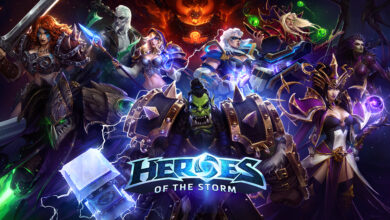
- Knowledge is power
- The Future Of Possible
- Hibs and Ross County fans on final
- Tip of the day: That man again
- Hibs and Ross County fans on final
- Spieth in danger of missing cut
Gaming has been an integral part of our world for decades. From the days of Pong and Space Invaders to the current era of consoles and PC gaming, the industry has come a long way. With the development of new technologies, such as VR and AR, it seems that the gaming industry is poised for even more rapid evolution. So what does the future hold for gaming? Will traditional consoles become obsolete? To find out, we spoke with an industry insider, an EA executive. In this post, we will share our insights from the interview and explore the future of gaming. We’ll look at the rise of mobile gaming, the potential of cloud gaming, and the impact of new technologies, such as AI, on gaming experiences. Join us as we take a deep dive into the world of gaming and discuss what the future may hold for this exciting and rapidly-evolving industry.
The evolving landscape of gaming
Gaming has come a long way since its inception. From the days of pixelated graphics and simplistic gameplay, it has transformed into a multi-billion dollar industry that captivates millions of players around the world. With advancements in technology, the landscape of gaming continues to evolve at a rapid pace, leaving us to wonder: will consoles become obsolete?
In this blog post, we have the privilege of gaining insights from an EA (Electronic Arts) executive who is at the forefront of the gaming industry. With their vast experience and insider knowledge, we will delve into the future of gaming and explore the potential fate of traditional gaming consoles.
As technology continues to advance, so does the way we consume entertainment. The rise of mobile gaming and the massive success of games like Fortnite, played on smartphones and tablets, have challenged the dominance of consoles. The convenience and portability offered by these devices have undoubtedly reshaped the way we play games.

Furthermore, cloud gaming has emerged as a game-changer in recent years. With platforms like Google Stadia and Microsoft xCloud, players can stream games directly to their devices, eliminating the need for expensive hardware. This shift towards cloud-based gaming opens up a world of possibilities, allowing players to access their favorite games from any device with an internet connection.
However, while the landscape may be shifting, traditional consoles still hold a significant place in the hearts of many gamers. The power and graphical capabilities of dedicated gaming consoles provide an immersive experience that is hard to replicate on other platforms. The release of next-generation consoles like the PlayStation 5 and Xbox Series X showcases the ongoing commitment to pushing the boundaries of gaming technology.
In the following sections, we will explore the various factors that contribute to the evolving landscape of gaming and delve into the insights shared by our EA executive. From advancements in virtual reality to the impact of mobile gaming, we will analyze the potential future scenarios and discuss whether consoles are destined to become obsolete.
Get ready to embark on an exciting journey into the future of gaming, where we will uncover the possibilities that lie ahead and gain valuable insights into the industry’s direction. Brace yourself for a thought-provoking exploration of an ever-changing gaming landscape.
The rise of mobile gaming and its impact on consoles
The landscape of gaming has been undergoing a significant transformation in recent years, largely due to the rise of mobile gaming. With the advancements in technology, smartphones have become more powerful, allowing users to enjoy immersive gaming experiences right in the palm of their hands. This shift has undoubtedly had an impact on the traditional gaming console market.
As an EA executive, I have witnessed firsthand the growing popularity and influence of mobile gaming. The convenience and accessibility of gaming on mobile devices have attracted a massive audience, including both casual gamers and dedicated enthusiasts. Mobile games offer a diverse range of genres, from puzzle games to RPGs, catering to a wide array of preferences.
This surge in mobile gaming has raised questions about the future of consoles. Will they become obsolete in the face of this mobile gaming revolution? While some may argue that consoles will become redundant, I believe there will always be a place for them in the gaming industry.
One of the key advantages consoles have over mobile devices is their superior processing power. Consoles are specifically designed for gaming, allowing for more complex and visually stunning games that push the boundaries of what is possible. The immersive experience provided by consoles, with their high-definition graphics and advanced gameplay features, cannot be replicated on a mobile device.

Moreover, consoles offer a social aspect that mobile gaming often lacks. Whether it’s playing with friends locally or engaging in online multiplayer matches, consoles have long been a hub for social interaction in gaming. This sense of community and shared experiences is something that cannot be easily replicated on mobile platforms.
That being said, it would be remiss to ignore the impact of mobile gaming on the industry. The accessibility and convenience of gaming on smartphones have attracted a vast and diverse audience, expanding the gaming market in ways we never thought possible. This has forced console manufacturers to adapt and innovate, incorporating mobile elements into their consoles to enhance the overall gaming experience.
While mobile gaming has undoubtedly made its mark on the gaming industry, consoles are far from becoming obsolete. They offer unique advantages, such as superior processing power and social interaction, that cannot be replicated on mobile devices. However, the future of gaming lies in finding a harmonious balance between the two, leveraging the strengths of each platform to create a gaming experience that is truly immersive and inclusive.
The emergence of cloud gaming and its potential to disrupt the console market
The gaming industry is constantly evolving, and one of the most significant advancements in recent years is the emergence of cloud gaming. With cloud gaming, players can stream games directly to their devices without the need for expensive consoles or powerful hardware. This technology has the potential to disrupt the console market as we know it.
Cloud gaming offers several advantages over traditional console gaming. Firstly, it eliminates the need for physical game discs or downloads, allowing players to instantly access a vast library of games with just a few clicks. This convenience and ease of access are appealing to gamers who value instant gratification and a seamless gaming experience.
Furthermore, cloud gaming opens up gaming to a wider audience. Players no longer need to invest in expensive gaming consoles or PCs to enjoy high-quality gaming. Instead, they can play on devices they already own, such as smartphones, tablets, or smart TVs. This accessibility can attract a new wave of gamers who may have been hesitant to enter the console market due to the cost or technical requirements.
Another benefit of cloud gaming is the ability to play games across multiple devices. Players can start a game on their console and continue playing on their smartphone or laptop without any interruptions. This flexibility allows gamers to enjoy their favorite titles wherever they are, providing a seamless gaming experience that transcends the limitations of traditional consoles.
While cloud gaming shows great promise, there are still challenges to overcome. One of the main concerns is the reliance on a stable internet connection. Streaming games require a consistent and high-speed internet connection to ensure smooth gameplay, which can be a limitation for players in areas with poor internet infrastructure. Additionally, there may be concerns around data privacy and security, as cloud gaming requires transmitting sensitive user data over the internet.
Despite these challenges, industry experts and executives, like those at EA, recognize the potential of cloud gaming to revolutionize the gaming industry. It has the power to reshape the way we play and experience games, offering unparalleled convenience, accessibility, and flexibility to gamers worldwide.
As we look to the future of gaming, it is clear that cloud gaming will play a significant role. While consoles may not become entirely obsolete, the rise of cloud gaming will undoubtedly disrupt the traditional console market. It will be fascinating to see how this technology continues to evolve and shape the gaming landscape in the years to come.
Insights from an EA executive on the future of consoles

In an ever-evolving gaming landscape, it is natural to wonder about the future of consoles. To gain valuable insights into this topic, we turn to an EA executive who sheds light on the subject.
As gaming technology continues to advance at an astonishing pace, the role of consoles has undergone significant transformations. With the rise of cloud gaming platforms, streaming services, and mobile devices, some have questioned whether consoles will become obsolete.
According to the EA executive, while the gaming industry is undoubtedly shifting towards a more diverse and accessible ecosystem, consoles will continue to play a significant role in the future. The executive highlights that consoles provide a unique gaming experience, offering superior graphics, immersive gameplay, and dedicated hardware optimized for gaming performance.
Additionally, consoles have a loyal and dedicated fan base that appreciates the traditional console gaming experience. This passionate community eagerly anticipates the latest console releases and cherishes the sense of community that comes with console gaming.
However, the EA executive acknowledges the need for adaptation and innovation. They emphasize that console manufacturers and game developers must stay ahead of the curve by embracing new technologies and trends. This includes integrating cross-platform functionality, leveraging cloud-based gaming services, and exploring virtual reality and augmented reality gaming experiences.
Ultimately, the future of consoles lies in their ability to adapt and evolve with the ever-changing gaming landscape. While new platforms and technologies may emerge, consoles will continue to hold a special place in the hearts of gamers worldwide, offering unique experiences and pushing the boundaries of what gaming can be.
The advantages and limitations of console gaming
Console gaming has been a staple in the gaming industry for decades, providing gamers with immersive experiences and cutting-edge technology. However, as technology continues to evolve at a rapid pace, questions arise about the future of consoles and whether they will become obsolete.
One of the major advantages of console gaming is the dedicated hardware and optimized software. Consoles are specifically designed for gaming, allowing for a seamless and immersive experience. The hardware is built to handle the demands of high-quality graphics and processing power, ensuring smooth gameplay and stunning visuals. Additionally, consoles often have exclusive games and features that are tailored specifically for their platforms, offering gamers unique and compelling experiences.
Furthermore, console gaming provides a more standardized and controlled environment. Developers can optimize their games for specific console hardware, leading to better performance and stability. This allows for a consistent gaming experience across all consoles of the same generation. Additionally, consoles often come with additional peripherals such as controllers and accessories that enhance gameplay and provide a more immersive experience.
However, console gaming also has its limitations. One of the main drawbacks is the lack of flexibility and upgradability. Unlike PCs, consoles have fixed hardware configurations that cannot be easily upgraded. This means that as technology advances and new hardware becomes available, console gamers may not be able to take advantage of these advancements without purchasing a new console. This can be a significant investment for gamers who want to stay at the cutting edge of gaming technology.
Another limitation is the closed ecosystem of consoles. Unlike PCs, which offer a wide range of software and customization options, consoles are often limited to specific platforms and ecosystems. This can restrict gamers in terms of game availability, online services, and compatibility with other devices. Additionally, consoles typically require an internet connection for updates and online features, which may be a limitation for gamers in areas with limited or unreliable internet access.
Console gaming has numerous advantages in terms of optimized hardware, exclusive games, and a controlled gaming environment. However, the limitations of fixed hardware configurations and closed ecosystems raise questions about their long-term viability in the face of rapidly advancing technology. As the gaming industry evolves, it remains to be seen whether consoles will adapt and continue to thrive or if new forms of gaming will render them obsolete.
The integration of consoles and streaming services
One of the most significant developments in the gaming industry in recent years has been the integration of consoles and streaming services. As technology continues to advance at a rapid pace, the traditional model of gaming consoles may face some challenges in the future.
Streaming services, such as Google Stadia, Microsoft xCloud, and PlayStation Now, have gained traction and popularity among gamers worldwide. These services allow players to access a vast library of games without the need for expensive hardware or physical game discs. All that is required is a stable internet connection and a compatible device.
This integration of consoles and streaming services brings several advantages to both gamers and game developers. For gamers, it offers the convenience of instant access to a wide range of games without the need to invest in expensive consoles. It also eliminates the need for frequent hardware upgrades, as the games are processed and streamed from powerful servers.
From a game developer’s perspective, the integration of consoles and streaming services opens up new possibilities for reaching a broader audience. Developers can create games that are optimized for streaming platforms, allowing them to tap into the growing market of casual gamers who may not have traditionally invested in gaming consoles.
However, the future of consoles is far from certain. While streaming services have gained popularity, there are still some challenges to overcome. Internet connectivity issues, data caps, and latency can impact the streaming experience and hinder the widespread adoption of these services. Additionally, some gamers still prefer the tactile experience of playing on a dedicated console with physical controllers.
Despite these challenges, the integration of consoles and streaming services represents a significant shift in the gaming landscape. It opens up new possibilities for gamers and game developers alike, offering convenience, accessibility, and a more connected gaming experience. Whether consoles will become obsolete in the future remains to be seen, but one thing is certain – the gaming industry is evolving, and the integration of consoles and streaming services is playing a crucial role in shaping its future.
The role of virtual reality (VR) and augmented reality (AR) in gaming
Virtual reality (VR) and augmented reality (AR) have been making waves in the gaming industry, hinting at a potential future where consoles may become obsolete. These emerging technologies have the power to revolutionize the gaming experience, creating immersive and interactive worlds that blur the lines between reality and the virtual realm.
VR gaming, in particular, has gained significant traction in recent years, with advancements in hardware and software paving the way for more realistic and captivating experiences. Players can now don a VR headset and find themselves transported into a completely different world, where they can interact with their surroundings and engage in thrilling gameplay like never before. From exploring fantastical landscapes to engaging in heart-pumping battles, VR gaming offers a level of immersion that consoles simply cannot match.

On the other hand, augmented reality (AR) takes a different approach by overlaying digital elements onto the real world. Popularized by mobile games like Pokémon Go, AR gaming allows players to interact with virtual objects and characters in their physical environment. Imagine battling virtual creatures in your own backyard or solving puzzles that merge the digital and real worlds seamlessly. AR has the potential to transform the way we perceive and engage with our surroundings, opening up new possibilities for gaming experiences.
While VR and AR hold immense promise for the future of gaming, there are still challenges to overcome. The cost of entry, including the price of VR headsets and the need for powerful hardware, remains a barrier for many gamers. Additionally, developers need to continue pushing the boundaries of these technologies, ensuring that the content and experiences they offer are compelling enough to attract a wider audience.
Despite these challenges, the potential for VR and AR to reshape the gaming landscape cannot be ignored. As more advancements are made and accessibility improves, we can expect to see a shift in how games are played and experienced. Consoles may find themselves competing with these immersive technologies, or they may need to adapt and integrate VR and AR capabilities to stay relevant in the evolving gaming industry.
Ultimately, the future of gaming rests on the ability to blend reality and virtuality seamlessly. VR and AR have the potential to take gaming to new heights, offering experiences that were once confined to the realm of imagination. Whether consoles become obsolete or transform themselves to embrace these technologies, it is certain that the future of gaming will be an exciting and immersive journey for players around the world.
The potential challenges and barriers to the obsolescence of consoles
While the future of gaming seems to be heading towards a more digital and cloud-based landscape, it’s important to consider the potential challenges and barriers that may hinder the complete obsolescence of consoles. As an EA executive, I have had the opportunity to closely observe the gaming industry and its evolving trends.
One of the primary challenges faced by the potential obsolescence of consoles is the attachment and loyalty gamers have towards their gaming consoles. Many gamers have grown up with consoles and have developed a sense of familiarity and emotional connection with them. The console gaming experience, from the physicality of the controller to the immersive gameplay on a big screen, offers a unique and nostalgic appeal that may be hard to replicate in entirely cloud-based platforms.
Furthermore, the limitations of internet infrastructure pose a barrier to the widespread adoption of cloud gaming. While advancements have been made in terms of internet speeds and accessibility, there are still regions with unreliable or slow internet connections. This can affect the quality of gameplay, introducing latency and lag, which can be frustrating for gamers.
Additionally, the cost associated with cloud gaming services may deter some gamers from fully embracing a console-less future. Subscription-based models and high-speed internet requirements may not be feasible or affordable for everyone, especially in developing regions or for individuals on a tight budget.
Moreover, the gaming industry has a diverse range of gamers with varying preferences and needs. Console gaming offers a sense of ownership and offline play that might not be adequately replicated in a cloud-based environment. Some gamers may prefer the tangible aspect of physical game collections or the ability to play without relying on an internet connection.
However, it’s important to note that the gaming industry is constantly evolving and adapting to new technologies. While consoles may not become entirely obsolete, we can anticipate a convergence of console and cloud gaming, where both platforms coexist and complement each other. Hybrid models that leverage the strengths of both consoles and cloud gaming are likely to emerge, providing gamers with a seamless and enhanced gaming experience.
While the obsolescence of consoles may face challenges and barriers, the gaming industry is undoubtedly shifting towards a more digital and cloud-based future. It will be interesting to see how console manufacturers and game developers navigate this evolving landscape, ensuring that gamers are provided with innovative and immersive gaming experiences, regardless of the platform they choose.
The future of gaming: A hybrid approach?
As technology continues to evolve at an unprecedented pace, the future of gaming is a subject of great interest and speculation. With the rise of cloud gaming services and the increasing popularity of mobile gaming, one question that often arises is whether consoles will become obsolete in the coming years.
To shed some light on this topic, we sat down with an executive from EA, one of the leading game development companies in the industry. According to the executive, the future of gaming may not be an either-or scenario but rather a hybrid approach that combines the best of both worlds.
The executive explained that while consoles have traditionally offered a powerful and immersive gaming experience, the convenience and accessibility of cloud gaming cannot be ignored. With cloud gaming, players can stream games directly to their devices without the need for expensive hardware, making gaming more accessible to a wider audience.
However, the executive emphasized that consoles still have their place in the gaming landscape. The hardware capabilities of consoles allow for more advanced graphics, faster processing speeds, and greater storage capacities, which are crucial for delivering high-quality and immersive gaming experiences.
The future of gaming, as per the executive’s insights, lies in finding a balance between the convenience of cloud gaming and the performance of console gaming. This could mean that future consoles might incorporate cloud gaming technology, allowing players to seamlessly switch between local and cloud-based gaming experiences.
Furthermore, the executive discussed the importance of cross-platform gaming, where players can enjoy the same game on different devices, regardless of whether it’s a console, PC, or mobile device. This trend is already gaining traction, with games like Fortnite and Minecraft offering cross-platform compatibility, enabling players to connect and play with friends on different devices.
The future of gaming is likely to be a hybrid approach that embraces both cloud gaming and consoles. While cloud gaming offers convenience and accessibility, consoles provide the necessary hardware capabilities for delivering immersive gaming experiences. Additionally, the industry’s shift towards cross-platform gaming reinforces the idea that gaming platforms will become more interconnected, allowing players to enjoy their favorite games seamlessly across multiple devices.
The coexistence and evolution of consoles in the gaming industry
The future of gaming will see the coexistence and evolution of consoles alongside other gaming platforms. While there have been debates about the potential obsolescence of consoles, it is evident that they still hold a significant place in the gaming industry.
Consoles offer a unique gaming experience that cannot be easily replicated on other platforms. The powerful hardware, dedicated controllers, and immersive gameplay have been a hallmark of console gaming for decades. This, coupled with exclusive titles and the strong fanbase, ensures that consoles continue to thrive.
However, the gaming landscape is constantly evolving, and new technologies are emerging. The rise of cloud gaming, mobile gaming, and streaming services have introduced alternative ways to enjoy games. These platforms offer convenience and accessibility, appealing to a broader audience.
Rather than becoming obsolete, consoles are adapting to embrace these changes. Major console manufacturers have already started integrating cloud gaming into their systems, allowing players to stream games directly to their consoles. This hybrid approach combines the benefits of traditional console gaming with the flexibility of cloud-based services.
Furthermore, consoles are now expanding their ecosystem beyond gaming. They are becoming entertainment hubs, offering streaming services, social media integration, and multimedia capabilities. This diversification helps consoles remain relevant in the digital age where consumers demand more than just gaming experiences.
Ultimately, the future of gaming will see consoles coexist with other platforms, each catering to different preferences and needs. While mobile gaming and cloud-based services continue to grow, consoles will continue to provide a premium gaming experience for enthusiasts. The industry’s focus will shift towards delivering seamless integration between different gaming platforms, allowing players to enjoy their favorite games across devices.
As an EA executive, I firmly believe that consoles will remain an integral part of the gaming industry. They will continue to innovate, adapt, and evolve to meet the changing demands of gamers. The coexistence of consoles with other platforms will only enhance the overall gaming experience, offering a variety of options for players to choose from.
While the future may see a shift in gaming dynamics, consoles will not become obsolete. They will thrive by embracing new technologies, expanding their capabilities, and providing unique gaming experiences that cannot be replicated elsewhere. The gaming industry is an ever-evolving landscape, and consoles will continue to play a vital role in shaping its future.
As the gaming industry continues to evolve, the question of whether consoles will become obsolete remains a hot topic of debate. In this blog post, we had the privilege of gaining insights from an EA executive about the future of gaming. With advancements in technology and the rise of cloud gaming, the landscape of gaming is undoubtedly changing. However, consoles still hold a special place in the hearts of many gamers. While the future may bring new innovations and platforms, it seems that consoles will continue to play a significant role in the gaming industry for the foreseeable future. Thank you for joining us on this exploration of the future of gaming, and may your gaming experiences always be filled with excitement and adventure!




